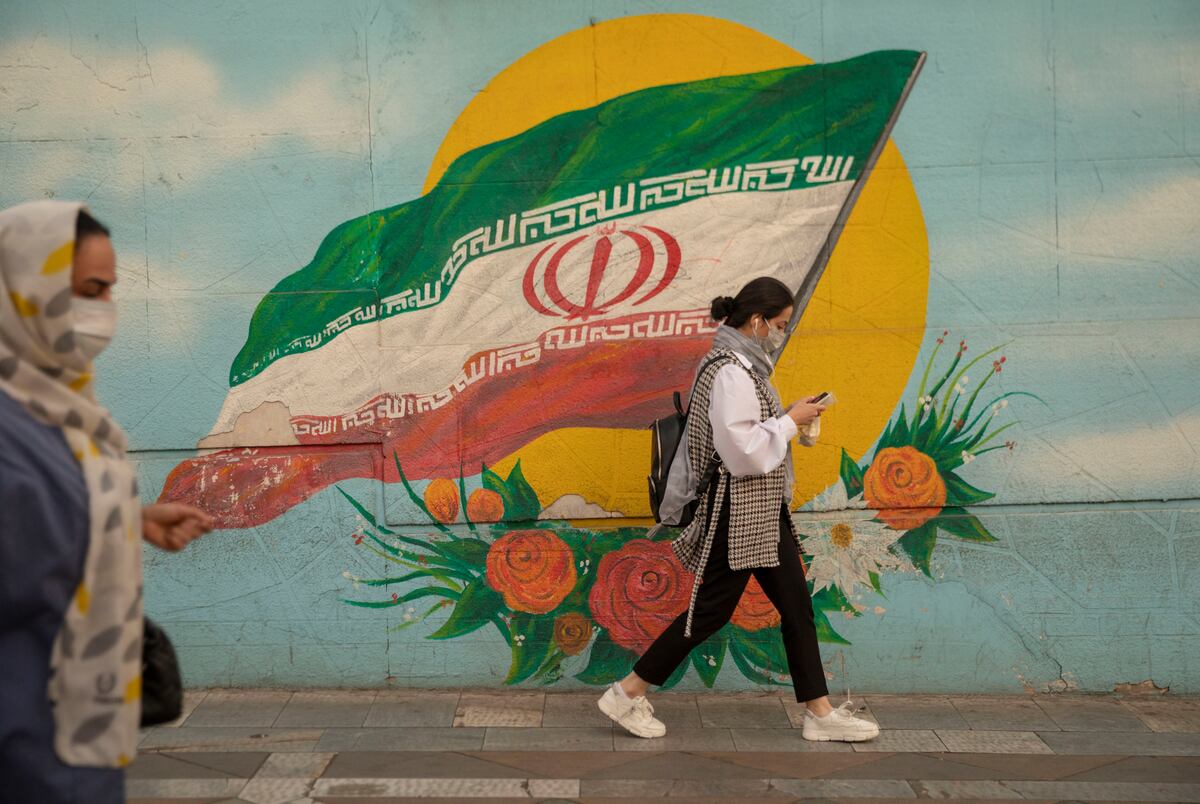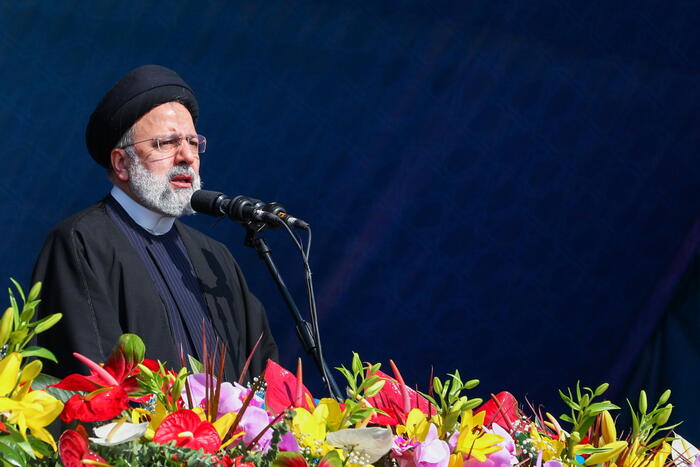The man who has been leading the Iranian police since last January is a
hawk,
a member of the regime's hard wing.
The United States, which sanctioned him in 2010, describes him as a torturer.
With his own hands.
General Ahmad Reza Radan was not only "responsible for beatings, killings and arbitrary arrests and imprisonments of protesters committed by police forces" when he was
number two
of that security body, according to the Treasury Department.
He also personally beat the detainees, say Washington and the European Union.
Radan was the one who announced on April 8 that, starting the following Saturday, the 15th, women who dispense with the mandatory veil in Iran would be identified with cameras, warned and brought before a judge if they reoffended.
The response of some Iranians on social networks was to compare that threat with the always postponed and unfulfilled promise to go on a diet.
Several women later shared smiling photos without a veil on social networks with the
hashtag
: "Where are you, Radan?"
This police chief has shown a fixation with clothing and appearance.
Of men and, above all, of women.
He is a staunch supporter of mandatory hijab and of the morality police, the security force that arrested Mahsa Amini, the young woman whose death sparked the latest wave of protests in Iran in September, for not wearing a veil properly.
In 2007, Radan ordered the arrest of men who sported “a kinky hairstyle” — long hair or a “Western” cut — and, in 2011, he banned private hospital medics from wearing ties.
On April 8, the general warned that cameras to identify unveiled women "would not make mistakes."
Last weekend, when that surveillance officially began,
Laughing if it weren't for what's behind it: while driving, the Iranian cleric and former vice president @abtahi_m receives a notice on his mobile to put on... the veil.
He sardonically wonders if the turban is the clerics' hijab.
The Iranians are sure not amused https://t.co/RbhgWd6ShZ
— Angeles Espinosa (@angelesespinosa) April 18, 2023
Other Iranian men have spent weeks spreading photos wearing the veil, in solidarity with the women of their country, or images in which they make an ironic interpretation of the dress code of the regime, in which they wear the Islamic headscarf but combine it with a Prohibited garment: shorts.
Iran's Food & Drug Administration has ordered pharmacies to force their female staff to wear black veils at workplace.
Iranian men are mocking this order and supporting their female colleagues by wearing hijab.
Compulsory hijab is the main pillar of a religious relationship.… pic.twitter.com/cnngIXynGm
— Masih Alinejad 🏳️ (@AlinejadMasih) March 7, 2023
Men in Iran continue to be photographed 'observing' the government's mandatory hijab law in solidarity with the #WomanLifeFreedom protest movement.
#MahsaAmini#زن_زندگی_آزادی pic.twitter.com/NthlkBbnYP
— Jonathan Harounoff (@JonathanHaroun1) April 20, 2023
These humorous challenges in a "dramatic" context, explains Iran expert Daniel Bashandeh, demonstrate, on the one hand, "the total disconnect between the regime and the population," but also that society "has entered" a phase of disobedience. civil".
Its epitome is women who disobey the mandatory veil law but another of its manifestations is a humor that highlights "how ridiculous the measures of the Iranian regime are" and the "loss of fear", Bashandeh asserts.
The jokes also have a "key asset: dissemination on social networks."
The terrible context to which Bashandeh alludes is that of the repression of demonstrations denounced by Iranian human rights organizations in exile and the United Nations.
According to their data, between September and February, some 500 people died at the hands of paramilitary and security forces while at least 22,000 were detained.
Four young men have been hanged in connection with the protests.
The jokes, the memes, the hilarious images do not detract from the "weight" of these "terrible" events, adds the Iranian intellectual exiled in Spain Ryma Sheermohammadi, but without the humor that the Iranians have displayed since the beginning of the demonstrations, Sheermohammadi emphasizes , “it would have been very difficult to keep people [demonstrating] in the streets”.
In an editorial last November, the specialized political media
POLITICO
warned that, during anti-regime protests in Iran, "Tehran's theocrats" faced "two of the biggest threats authoritarian regimes can face: a revolt led by women and public ridicule."
The publication cited research from the Harvard Kennedy School that suggested that "movements in which women participate in large numbers," such as the one in Iran, "are more likely to succeed and usher in periods of sustained democratization." .
The article also mentioned a study by the Washington Institute for World Politics stating: "Dictators, tyrants, and those who aspire to seize and maintain power through intimidation and force cannot tolerate public ridicule." .
erode authority
Saeid Golkar is an Iranian Professor of Political Science at the University of Tennessee (United States).
An expert in comparative politics of authoritarian regimes, one of his classes focuses, he explains via WhatsApp, on the role of jokes and daily life in dictatorships.
"In authoritarian regimes, jokes and political satire serve to erode authority and unify and create an identity among dissidents that is usually us vs. them."
This expert sees an evolution in the way Iranians use irony and satire, which has gradually shifted from targeting individual politicians "to targeting the regime itself."
Those Iranians who post their photo with the Islamic headscarf on social networks "are ridiculing one of the pillars" of the Iranian regime, Golkar says, referring to the hijab.
The veil is the symbol of Islamic morality, so jokes about it attack "the heart of the system."
Another aspect of this use of humor is "that when one makes fun of something, fear decreases."
The jokes that proliferate in Iran about the unpopular Basij militia, to whom a large part of the deaths in the repression of the protests are attributed, are paradigmatic.
These paramilitaries are described as petty, simple-minded beings with poor personal hygiene.
The professor tells one of these jokes: “A
Basiji
finds a magic lamp, rubs it, and a genie appears and grants him a wish.
The
basiji
tells him: he frees the holy city of Jerusalem from the hands of Israel.
The genius replies: that is very difficult, besides, what do you care about Jerusalem?
That is a story between Palestinians and Israelis.
Come on, ask me for something easier.
The
Basiji
tells him: then stop us Iranians from thinking that we
Basiji
are all fools.
The genie replies: come, I liberate Jerusalem.
Jokes like this and those that even run about the founder of the Islamic Republic, Ayatollah Ruhollah Khomeini, "delegitimize the system, ridicule its leader [the current one is Ayatollah Ali Khamenei], challenge political propaganda and are a show of resistance ”.
If there is a figure that embodies the Iranian Islamic regime, it is that of the mullahs, those learned in the law and Islamic jurisprudence.
Since the start of the protests, numerous social media users have posted videos showing what some Western or Iranian diaspora journalists have dubbed the “mullah game”: an Iranian man or woman, usually very young, throws at the He slapped down one of the clerics' symbols of religious authority, the turban, before running away.
Le jeu favori de la jeunesse iranienne en ce moment?
Faire sauter le turban des mollahs.
Le turban, le symbole de 43 ans du pouvoir clérical et aussi 43 ans de harcèlement et d'insécurité pour les femmes "mal voilées" dans les rues.
Here is a video of the best of compilation!
pic.twitter.com/qzFhaQZKA7
— lettres de Tehran (@LettresTeheran) November 23, 2022
Follow all the international information on
and
, or in
our weekly newsletter
.
Subscribe to continue reading
Read without limits
Keep reading
I'm already a subscriber








